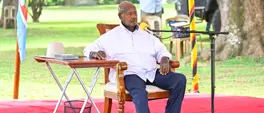CHARLES MATSEKE | Shivambu learns from Zuma: When loyalty is a weapon and not a virtue
Charles Matseke
20 June 2025 | 10:20The striking similarities between Shivambu’s recent maneuvers within the MK Party and Zuma’s own dealings with the ANC are too calculated to ignore, writes Charles Matseke.

MK Party member Floyd Shivambu held a media briefing in Midrand on Thursday, 19 June 2025. Picture: Jacques Nelles/EWN
"I learn from the best," Floyd Shivambu might as well have said, as he appears to be taking a page from Jacob Zuma’s infamous political playbook.
The striking similarities between Shivambu’s recent maneuvers within the MK Party and Zuma’s own dealings with the ANC are too calculated to ignore.
Although Jacob Zuma had long distanced himself ideologically and strategically from the African National Congress (ANC), he never formally severed ties. Instead, he turned the weapon of loyalty into a political shield.
He repeatedly insisted that he would never leave the ANC, all while undermining its authority, sowing internal divisions, and daring the party to expel him. He turned victimhood into a tool and conflict into a campaign strategy. Ultimately, Zuma forced the ANC into the difficult position of having to fire him and in doing so, he retained his political relevance while framing himself as a martyr of the revolution.
Now we see a strikingly similar script playing out this time, starring Floyd Shivambu. In a recent press briefing, Shivambu declared unequivocally that he "will never leave the MK Party". But the very event at which he made this pronouncement was not sanctioned by the MKP.
His actions were supposedly organising parallel structures, giving unauthorised statements, and politically posturing, which are increasingly antagonistic to both Zuma and the party he once hailed as the beacon of progressive transformation.
Yet, Shivambu persists in aligning himself with the MKP, despite mounting evidence that he no longer enjoys legitimacy or future prospects within its structures. Why cling to a party that is already inching him toward the exit?
The answer lies in optics and political strategy. Like Zuma, Shivambu understands the symbolic power of being expelled rather than resigning. Resignation would be an admission of defeat and ideological inconsistency.
But expulsion allows him to spin a narrative of victimhood, betrayal, and purity of purpose. It would enable him to tell his supporters that he was pushed out for being principled for defending the "true" values of the MKP, rather than for political indiscipline or opportunism.
This tactic of performative loyalty followed by calculated disruption is not unique to Zuma or Shivambu. It is increasingly becoming a trend among leaders of de facto parties born from ANC ruptures including the EFF, COPE, ATM, MKP, and even the UDM all share some variation of this trajectory. These parties tend to emerge not merely from ideological divergence, but from leadership battles, ego clashes, and power struggles dressed in ideological robes.
What this reveals is a deeper crisis within South Africa’s so-called progressive movement. The national democratic discourse, once anchored in coherent, mass-based, liberation politics, has become fragmented, personalistic, and performative.
Political formations born from ANC dissent are often more focused on settling old scores than articulating new visions. Internal contestation is no longer about ideological sharpening; it's a means to engineer martyrdom and maintain relevance in a media-saturated, populist political economy.
In this regard, Shivambu’s actions signal a broader decay in the discipline of political activism. Rather than building enduring structures based on democratic centralism and ideological unity, today’s political actors prioritize loyalty theatrics, narrative management, and internal sabotage. It’s no longer about building movements and it’s about positioning oneself in the next chapter of political drama.
If the progressive forces are to retain their credibility and transformative agenda, they will have to interrogate these internal theatrics, and ask: At what point does revolutionary rhetoric become reactionary self-preservation?
And how long can the public tolerate parties that preach transformation but practice disruption? Shivambu may be learning from the best but equally so, South African politics deserves better.
If Shivambu continues this trajectory, he will likely splinter off or become part of yet another political offshoot, adding to the alphabet soup of ANC breakaways. But here’s the problem: none of these de facto splinter parties — COPE, EFF, ATM, UDM, and now MKP have shown sustainable capacity to run municipalities effectively. Instead, they contribute to hung councils, unstable coalitions, and policy paralysis.
The voters are watching and they are not merely watching what parties promise; they are also watching how politicians behave internally. Internal instability is increasingly viewed as a predictor of poor governance.
The sight of Shivambu holding press conferences at unsanctioned events, issuing grand proclamations while being sidelined by his own party, will not inspire confidence among municipal voters who are weary of endless chaos.
Zuma’s own maneuvering ahead of 2021 played a critical role in reshaping the local electoral map. His shadow support for independents, his alleged links to unrest, and ultimately the formation of MKP after years of discontent within the ANC, led to an unprecedented electoral moment. The ANC dropped below 50% nationally in local elections for the first time. Zuma may not have campaigned directly but his influence was decisive.
Shivambu, whether by design or accident, is walking into the same terrain. But here’s the danger: fragmentation without functional alternatives. If he breaks away or is expelled, his faction will either weaken the MKP from within or form yet another pseudo-progressive party that competes for limited township and peri-urban votes.
The continual birth of parties from ANC’s ashes might seem like democratic pluralism on the surface, but what we are really witnessing is the disintegration of coherent left politics in South Africa. The "progressive" space, once unified under clear ideological banners, has become a battlefield of egos, unstructured populism, and short-term electioneering. It’s a space where transformation is preached but political survival is prioritised.
This trend threatens the future of grassroots governance. In 2026, coalition politics will once again define most metros. The ANC will likely continue to decline. The DA will hold its strongholds. The EFF may plateau or slightly grow. The MKP might gain traction in KwaZulu-Natal but not without internal contradictions spilling into the public. Moreover, a new factions like a potential Shivambu-led bloc, will merely add noise without necessarily adding substance.
Unless parties can show discipline, ideological clarity, and a commitment to community-based service, 2026 will not be an election of renewal, it will be an election of recycled promises, unstable governance, and voter apathy. Floyd Shivambu may be learning from Zuma, but what worked for Zuma may not work in a more skeptical, impatient South Africa.
Voters are beginning to see through political theatre. They want clean streets, honest councillors, working taps, not party infighting, expulsions, and leadership stunts dressed as ideological commitment.
Charles Matseke (MPhil in Politics and International Relations) is a researcher and writer with a keen interest in contemporary political dynamics. His research focuses on electoral politics, foreign policy analysis, and international relations, with a particular emphasis on the Global South and Africa's role in global affairs.
Get the whole picture 💡
Take a look at the topic timeline for all related articles.
















